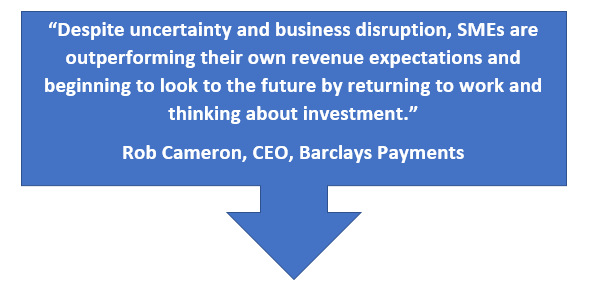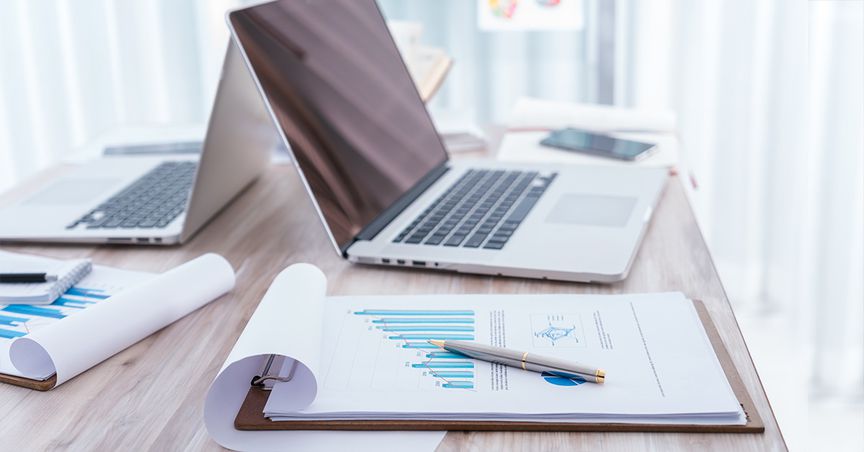Summary
- London City forecasters project the UK economy’s growth rate of 14.6 per cent for Q3 2020
- Aggregate consumer spending for the first two weeks of August 2020 was 7 per cent higher than observed during the corresponding period a year ago in 2019
- The Barclaycard payments’ SME barometer shot up from 79 to 95 between start of Q2 and Q3 2020 respectively
Various forecasts are coming in to indicate that the UK economy will bounce back with good economic growth during the third quarter of the year 2020. The main reason being citied is a rise in consumer spending.
The average forecast made by the leading economic institutions in London suggest that the UK economy will rebound in the third quarter of 2020, and will showcase a growth rate of 14.6 per cent during the period.
In fact, encouraging results have already started to flow in. According to latest data from Fable Data, a UK based consultancy firm, the aggregate consumer spending for the first two weeks of August 2020 was 7 per cent higher than observed during the corresponding period a year ago in 2019. This calls for a celebration as this is the first time after March 2020 that an year-on-year rise in spending growth has been observed across the nation. Economists suggest that the reasons for this uptick could have been a release of the pent-up demand and re-opening of schools across the nation.
Fable Data also found out that the government’s eat out to help out scheme has been successful and more meals were purchased across restaurants and pubs during the first two weeks of August 2020 than a month back in July 2020.
These pointers indicate that Britons might just be finally ready to spend once again after months of being locked down inside their homes, fearing to catch the Covid-19 infection.
The UK economy officially entered a recession in the second quarter of the year when its gross domestic product (GDP) contracted by almost one fifth, after shrining for 2.2 per cent during the first quarter of 2020. However, it was a reason to be optimistic that the economic output growth of the country was positive at 8.7 per cent for June 2020, the last month of the second quarter.
Boost in optimism among small business enterprises across the UK
The Barclaycard payments’ SME barometer shot up from 79 to 95 (out of 200 points) between start of Q2 and Q3 2020 respectively.
Further, the barometer also showed that the average daily values of the SME transactions grew by 60 per cent during July to Mid-August 2020, as compared to the corresponding values observed during Q2 (April to June 2020).

Barclays Research also found out that four-fifth of SMEs are planning to make a business investment to push their company in the next 12 months period.
The FTSE AIM All Share index, the equity index of smaller sized companies quoted on the AIM (alternative investment market) which slumped to 589.90 points on 19 March 2020, as a result of the coronavirus pandemic, was trading at 962.04 points on 24 August 2020 at 12.10 PM, up by 4.89 per cent from the previous day’s closure. This level is almost similar to the pre-pandemic levels for the index and one can safely infer that this index has been much more resilient as compared to bigger indices like FTSE 100 and FTSE 250.
Retail sales above the pre-pandemic levels
The retail sales for UK grew higher that the pre-pandemic levels for the first time in July 2020. According to the ONS data, July high-street sales were running 3 per cent above the pre-pandemic levels and 1.4 per cent higher than an year-ago levels.
Online sales were up by 50 per cent in early August 2020 as compared to the pre-pandemic levels across the country, according to the retail industry sources.
Recently, the Bank of England also said that the bounce back in consumer expenditure is expected to drive the UK’s economic growth in the third quarter of 2020.
There’s need for a cautious optimism
However, there are few things to watch out for, caution the market analysts. They say that it is difficult to predict the clear direction of the economy given the uncertainties surrounding the coronavirus pandemic, especially after the third quarter of the year 2020. The factors which need to be closely watched out for are: an emergence of a second wave of coronavirus infections, if consumption continues to sustain itself in a rising unemployment scenario, and the need to carry on with social distancing measures.
Samuel Tombs from Pantheon Macroeconomics Consultancy said that a primary reason for the sluggish UK economy was an elongated lockdown period. Later, government was also slow in stopping the virus’s spread from the nation’s hospitals, he added.
The under performance of the United Kingdom’s economy has been rooted also in its characteristic structure. It is an economy which is primarily driven by the services sector (a larger retail, hospitality and travel segments), which his more consumer facing than say manufacturing or farming. Therefore, social distancing measures particularly slowed down the nation’s services sector, which pulled down its economy.
The looming fear of a no-deal Brexit could also delay the economic recovery, as it could lead to higher cost of raw materials, operations etc.
Private business investment, a leading indicator of economic growth, dropped by a hefty 31.4 per cent during the second quarter of 2020, according to latest government statistics. If they do not pick up, recovery may take longer than expected.
And last but not the least – the job crisis is not yet over in Britain. There are worries that post October 2020, when the furlough scheme ends, more job losses could be expected across various industries.
To sum up, London based city forecasters are projecting the UK economy to grow at 14.6 per cent for the third quarter of 2020. While this is a news to cheer, however, many economists caution of growth inhibiting factors like a rise in infections, unemployment, no-deal Brexit, low private investment and the continued need to carry on with social distancing measures.



